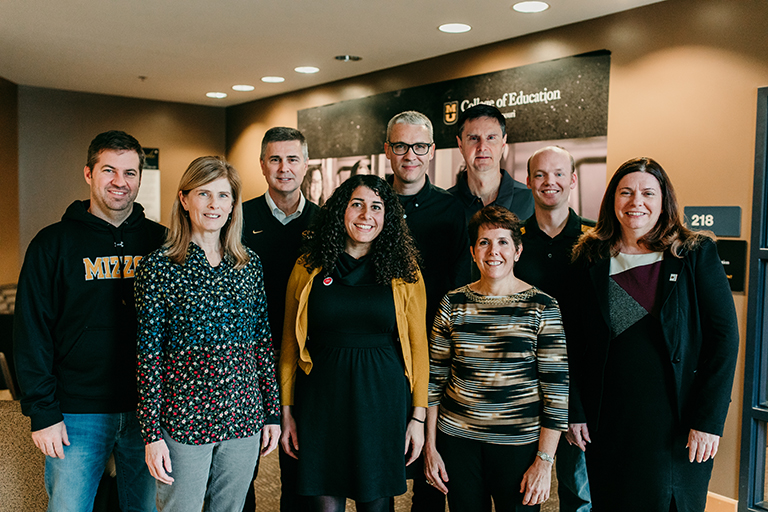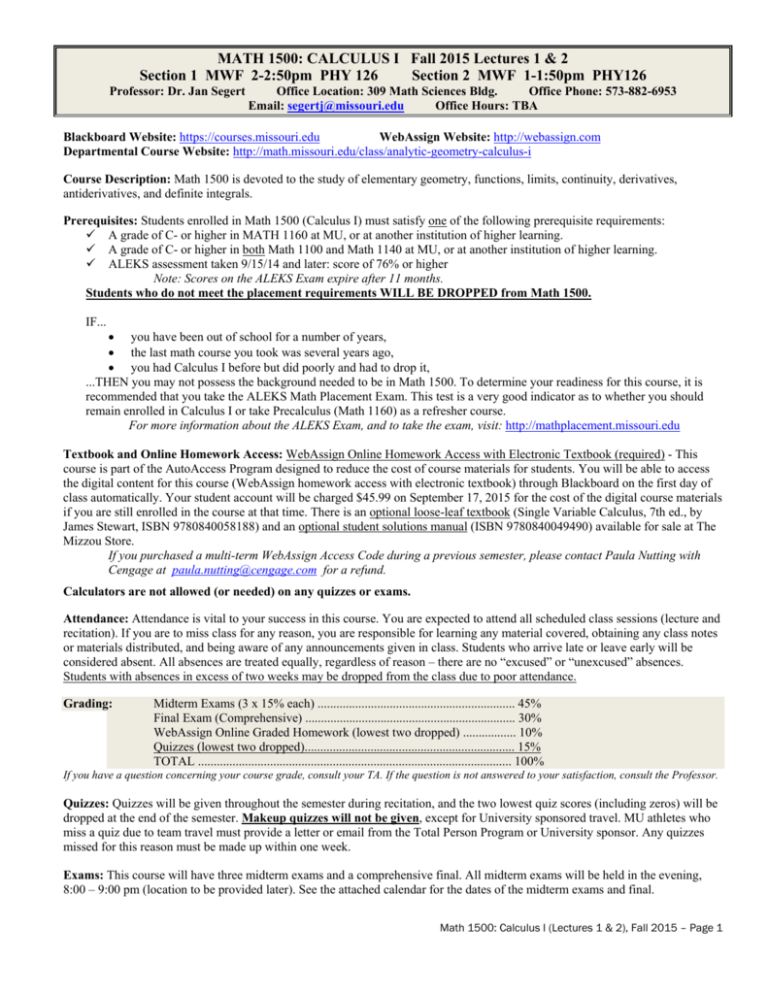Mizzou Math Courses
Mizzou Math Courses - Topics include logic, set theory, properties of functions and integers, the real number system, completeness of the real numbers, sequences of real numbers. In order to qualify to take a math department course at the university of missouri, students must have one of the following: A degree in mathematics provides one with both the applied mathematics knowledge necessary to engage in these disciplines, and formal reasoning skills that can be applied in any area. Students taking math 2320 or math 3000, need an additional. Math 1400 calculus for social and natural sciences. 9 additional credits in approved math courses (students not taking math 2320 or math 3000, must take all 9 credits at the 4000 level; Math 1300 introduces students to mathematical topics, concepts and algorithms relevant to business management and the social sciences. Web applied mathematics master of science (ms) designed to give students training in those areas of mathematics used frequently in applications. Algebraic geometry, analysis (real, complex, functional and harmonic), analytic functions, applied mathematics, financial mathematics and mathematics of insurance, commutative algebra, scattering theory, differential equations (ordinary and partial), differential geometry, dynamical systems, general relativit. Math 2300 (calculus 3) course topics and core homework problems the following information is provided for illustrative purposes. The equivalents of math 1500, math 1700 and math 2300. Web course description this course is devoted to the study of vectors, solid analytic geometry, and calculus of several variables. In order to qualify to take a math department course at the university of missouri, students must have one of the following: A degree in mathematics provides one with both. 9 additional credits in approved math courses (students not taking math 2320 or math 3000, must take all 9 credits at the 4000 level; Please visit the math placement tab for all policies regarding course placement and for information about the math placement assessment. These include financial mathematics, linear algebra, linear programming, combinatorics, probability and statistics. You may submit a. Web the active areas of research include: Web to minor in mathematics, a student must satisfactorily complete the following requirements. Both cumulative gpa and gpa in math courses numbered 1500 and above (expect for 2100) of 2.5 or above. You may submit a graduation plan in math after completion of english 1000 and math 2300. The equivalents of math 1500,. The equivalents of math 1500, math 1700 and math 2300. Details are subject to change. This course covers the 6th grade common core math standards. 202 math sciences building | 810 east rollins street | columbia, mo 65211. Web gateway to theoretical math courses. Completion of englsh 1000 and math 2300; Web mathematics is part of the foundation of all the sciences, engineering, statistics, and many social sciences. A degree in mathematics provides one with both the applied mathematics knowledge necessary to engage in these disciplines, and formal reasoning skills that can be applied in any area. Students will be provided with a solid. Web applied mathematics master of science (ms) designed to give students training in those areas of mathematics used frequently in applications. Algebraic geometry, analysis (real, complex, functional and harmonic), analytic functions, applied mathematics, financial mathematics and mathematics of insurance, commutative algebra, scattering theory, differential equations (ordinary and partial), differential geometry, dynamical systems, general relativit. Introduction to statistical inference, correlation and. Math 1400 calculus for social and natural sciences. Math 8420 and 8410 are required, as is either math 8190 (masters project) or math 8090 (masters thesis). Web to minor in mathematics, a student must satisfactorily complete the following requirements. Textbook elementary differential equations with boundary value problems by william boyce, richard diprima, and douglas meade, eleventh edition. 9 additional credits. Textbook elementary differential equations with boundary value problems by william boyce, richard diprima, and douglas meade, eleventh edition. These include financial mathematics, linear algebra, linear programming, combinatorics, probability and statistics. The equivalents of math 1500, math 1700 and math 2300. You must have an overall gpa of 2.5 or above, and a gpa in math courses used for the degree. Math 1400 calculus for social and natural sciences. Web the active areas of research include: Students will be provided with a solid foundation in ratios and proportional relationships, the number system, expressions and equations, converting between fractions, decimals and percents, and be introduced in how to graph given data as outlined in the 6th grade common. Web the new prerequisite. Web to minor in mathematics, a student must satisfactorily complete the following requirements. Web course description this course is devoted to the study of vectors, solid analytic geometry, and calculus of several variables. Web to receive a degree with honors in mathematics, a student must have a 3.5 grade point average in mathematics courses and a 3.33 gpa overall. Topics. Please visit the math placement tab for all policies regarding course placement and for information about the math placement assessment. Focus on reading and writing math proofs/rigorously developing background needed in adv calc/abstract alg. You must have an overall gpa of 2.5 or above, and a gpa in math courses used for the degree of 2.5 or above. Web mathematics is part of the foundation of all the sciences, engineering, statistics, and many social sciences. Geometric concepts this course is primarily for. Web students may apply to be math majors upon meeting the following criteria: Web course description this course is devoted to the study of vectors, solid analytic geometry, and calculus of several variables. You may submit a graduation plan in math after completion of english 1000 and math 2300. Web the new prerequisite requirements apply to all students enrolling in math courses, regardless of when they enrolled at mu. A degree in mathematics provides one with both the applied mathematics knowledge necessary to engage in these disciplines, and formal reasoning skills that can be applied in any area. Introduction to statistical inference, correlation and regression. Details are subject to change. Math 1300 introduces students to mathematical topics, concepts and algorithms relevant to business management and the social sciences. Math 8420 and 8410 are required, as is either math 8190 (masters project) or math 8090 (masters thesis). Web the active areas of research include: Algebraic geometry, analysis (real, complex, functional and harmonic), analytic functions, applied mathematics, financial mathematics and mathematics of insurance, commutative algebra, scattering theory, differential equations (ordinary and partial), differential geometry, dynamical systems, general relativit.
The Mizzou Store Math Review Fractions Study Guide

MU math specialists boost knowledge, confidence among elementary school

Unpacking the Missouri Learning Math Standards YouTube

Missouri MEGA Middle School Math Assessment PRACTICE PROBLEM Math

10 Math Courses at University of Missouri OneClass Blog

Mathematics education M Ed Mizzou Missouri Online

MATH 1500 University of Missouri

Mathematics Mizzou Academy

Missouri Math Pathways YouTube

Mathematics Graduate Program Department of Mathematics Missouri
Web Mathematics Master Of Arts (Ma) The Degree Requirements Include The Satisfactory Completion Of 30 Hours Of Approved Course Work, Of Which At Least 18 Hours Must Be At The 8000 Level.
In Order To Qualify To Take A Math Department Course At The University Of Missouri, Students Must Have One Of The Following:
Web Mathematics, Counting Methods And Basic Probability And Statistics, Systems Of Linear Equations And Matrices.
Web To Minor In Mathematics, A Student Must Satisfactorily Complete The Following Requirements.
Related Post: